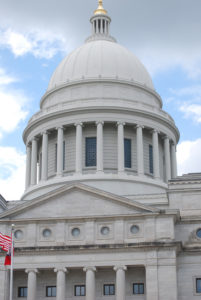 By Steve Brawner, © 2019 by Steve Brawner Communications, Inc.
By Steve Brawner, © 2019 by Steve Brawner Communications, Inc.
The legislative session at the Arkansas Capitol heads for the finish line. What’s left? Mostly spending your tax dollars and finalizing the constitutional amendments you’ll consider in 2020.
In the next few weeks, lawmakers will divvy up state funding through the Revenue Stabilization Act. First passed in 1945, it prioritizes spending. Higher priority areas are guaranteed to be funded while lower priorities get money if it’s available.
The RSA is a big reason the state doesn’t run budget deficits, though it does incur debt in other ways, such as retirement programs and bond issues. It would be nice if the federal government had a similar mechanism, but alas.
Since 2013, one state agency has dominated the process: the Division of Medical Services, which administers Arkansas Works. That’s the state program that purchases private health insurance for lower-income Arkansans.
As of March 1, it benefits 235,962 individuals. Without it, many wouldn’t have insurance and would have less access to health care. But it’s also a government program funded largely by debt-ridden Uncle Sam. For some Republicans, its Obamacare roots are enough to oppose it.
All spending bills require a three-fourths majority vote in both the House and Senate (another deterrent to budget deficits), so opponents have tried to block Arkansas Works by refusing to vote for the Division of Medical Services. It only takes nine of the 35 senators or 26 of the 100 representatives. There’s been much drama in some sessions, but ultimately legislators always fund the division and keep Arkansas Works.
But there’s been less drama lately. Gov. Asa Hutchinson supports the program (created during Gov. Mike Beebe’s administration), and few legislators really want to take health insurance away from 235,962 people absent a better idea. To make it easier for some to vote yes, the state under Hutchinson’s leadership created a work requirement. In his re-election campaign last year, he said it was necessary to get the three-fourths vote.
But now there’s a lawsuit, and the Washington, D.C.-based district judge, who’s also hearing a Kentucky case, says he’ll decide by the end of the month. There’s a good chance he voids the requirement.
So then do we have another fight? Doesn’t look like it. The program is embedded in the state’s health care system, it benefits too many people, and fights only last for so long. There will be a relatively close vote, but the division will get funded, as always.
What else? Legislators can refer up to three constitutional amendments for voters to consider. They’ve completed work on one to permanently extend the half-cent sales tax for highways. They’re advancing one to change term limits so legislators could serve 12 years (instead of the current 16) but then return to service after a four-year break. The likely third proposal would make it harder to change the Constitution.
Two bills are worth watching.
Senate Bill 571 by Senate Majority Leader Jim Hendren, R-Sulphur Springs, would cut taxes in large part for lower-income Arkansans while increasing taxes on cigarettes and e-cigarettes. I doubt it passes. The Senate narrowly voted yes Wednesday, but too many powerful House members oppose it, and the governor hasn’t shown support.
The other, Senate Bill 620, would create a school choice program to pay for about 500 low-income students in Pulaski County to attend private schools. It’s a Hutchinson bill, and he usually gets most of what he wants, but public schools and their advocates will go to war over this.
Lurking in the background are the coming elections, and not just the ones in 2020. In 2022, most statewide officials, including Hutchinson, will be term-limited, and U.S. Sen. John Boozman has not said he’ll run for re-election. Hutchinson made it clear in a televised interview last Sunday on the television show “Talk Business & Politics” that he’s not ready to retire.
Keep those elections in mind. People will be jockeying for positions. And the thing about politics is, once you reach the finish line, the next race immediately begins.